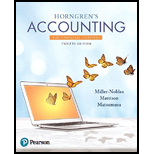
Horngren's Accounting, The Financial Chapters (12th Edition)
12th Edition
ISBN: 9780134486789
Author: Tracie L. Miller-Nobles, Brenda L. Mattison, Ella Mae Matsumura
Publisher: PEARSON
expand_more
expand_more
format_list_bulleted
Textbook Question
Chapter 9, Problem P9.34APGA
Using ratio data to evaluate a company’s financial position
| Learning Objective 5 1. Acid-test ratio (2018) 0.88 |
The comparative financial statements of Norfolk Cosmetic Supply for 2018, 2017, and 2016 include the data shown here:
| 2018 2017 2016 | |
| Balance sheet partial Current Assets: Cash Short-term Investments Merchandise Inventory Prepaid Expenses Total Current Assets Total Current Liabilities Income statement-partial Net Sales (all on account) |
$70,000 $ 60,000 $50,000 140,000 170,000 120,000 280,000 240,000 260,000 355,000 330,000 310,000 70,000 35,000 35,000 915,000 835,000 775,000 560,000 630,000 640,000 5,890,000 5,130,000 4,210,000 |
Requirements
1. Compute these ratios for 2018 and 2017.
a. Acid-test ratio (Round to two decimals.)
b. Accounts receivable turnover (Round to two decimals.)
c. Days’ sales in receivable (Round to the nearest whole day.)
2. Considering each ratio individually, which ratios improved from 2017 to 2018 and which ratios deteriorated? Is the trend favorable or unfavorable for the company?
Expert Solution & Answer
Want to see the full answer?
Check out a sample textbook solution
Students have asked these similar questions
I don't know answer please help me this question solution
Kindly help me with this question general accounting question
correct answer please
Chapter 9 Solutions
Horngren's Accounting, The Financial Chapters (12th Edition)
Ch. 9 - 1. With good internal controls, the person who...Ch. 9 - Which of the following is a limitation of the...Ch. 9 - 3. The entry to record a write-off of an...Ch. 9 - Brickman Company uses the allowance method to...Ch. 9 - Brickman’s ending balance of accounts Receivable...Ch. 9 - During the year, Bernard Company had net credit...Ch. 9 - At December 31 year-end, Crain Company has an...Ch. 9 - Using the data in the preceding question, what...Ch. 9 - At year-end, Schultz Company has cash of $11,600,...Ch. 9 - Using the data in the preceding question, assume...
Ch. 9 - What is the difference between accounts receivable...Ch. 9 - List some common examples of other receivables,...Ch. 9 - Prob. 3RQCh. 9 - When dealing with receivables, give an example of...Ch. 9 - What type of account must the sum of all...Ch. 9 - Prob. 6RQCh. 9 - What occurs when a business factors its...Ch. 9 - What occurs when a business pledges its...Ch. 9 - What is the expense account associated with the...Ch. 9 - When is bad debts expense recorded when using the...Ch. 9 - What are some limitations of using the direct...Ch. 9 - Prob. 12RQCh. 9 - Prob. 13RQCh. 9 - When using the allowance method, what account is...Ch. 9 - Prob. 15RQCh. 9 - Prob. 16RQCh. 9 - How do the percent-of-receivables and...Ch. 9 - What is the difference between the...Ch. 9 - In accounting for bad debts, how do the income...Ch. 9 - What is the formula to compute interest on a note...Ch. 9 - Prob. 21RQCh. 9 - Prob. 22RQCh. 9 - Prob. 23RQCh. 9 - Prob. 24RQCh. 9 - Prob. S9.1SECh. 9 - Recording credit sales and collections Learning...Ch. 9 - Applying the direct write-off method to account...Ch. 9 - Collecting a receivable previously written...Ch. 9 - Applying the allowance method to account for...Ch. 9 - Applying the allowance method (percent-of-sales)...Ch. 9 - Applying the allowance method...Ch. 9 - Applying the allowance method...Ch. 9 - Computing interest amounts on notes receivable...Ch. 9 - Accounting for a note receivable Learning...Ch. 9 - Accruing interest revenue and recording collection...Ch. 9 - Recording a dishonored note receivable Learning...Ch. 9 - Prob. S9.13SECh. 9 - Defining common receivables terms Learning...Ch. 9 - E9-15 Identifying and correcting internal control...Ch. 9 - Recording credit sales and collections Learning...Ch. 9 - Journalizing transactions using the direct...Ch. 9 - Accounting for uncollectible accounts using the...Ch. 9 - Accounting for uncollectible accounts using the...Ch. 9 - Accounting for uncollectible accounts using the...Ch. 9 - Prob. E9.21ECh. 9 - Journalizing credit sales, note receivable...Ch. 9 - Journalizing note receivable transactions...Ch. 9 - Journalizing note receivable transactions Learning...Ch. 9 - Journalizing note receivable transactions Learning...Ch. 9 - Evaluating ratio data Learning Objective 5 Abanaki...Ch. 9 - Computing the collection period for receivables...Ch. 9 - Accounting for uncollectible accounts using the...Ch. 9 - Accounting for uncollectible accounts using the...Ch. 9 - Accounting for uncollectible accounts using the...Ch. 9 - Prob. P9.31APGACh. 9 - Accounting for notes receivable and accruing...Ch. 9 - Prob. P9.33APGACh. 9 - Using ratio data to evaluate a company’s financial...Ch. 9 - Accounting for uncollectible accounts using the...Ch. 9 - Accounting for uncollectible accounts using the...Ch. 9 - Prob. P9.37BPGBCh. 9 - Prob. P9.38BPGBCh. 9 - Prob. P9.39BPGBCh. 9 - Accounting for notes receivable, dishonored notes,...Ch. 9 - Using ratio data to evaluate a company’s financial...Ch. 9 - Prob. P9.42CTCh. 9 - Prob. P9.43CPCh. 9 - Prob. P9.44PSCh. 9 - Prob. 9.1TIATCCh. 9 - Decision Case 9-1 Weddings on Demand sells on...Ch. 9 - Decision Case 9-2 Pauline’s Pottery has always...Ch. 9 - Prob. 9.1FCCh. 9 - Financial Statement Case 9-1 Use Target...
Knowledge Booster
Learn more about
Need a deep-dive on the concept behind this application? Look no further. Learn more about this topic, accounting and related others by exploring similar questions and additional content below.Similar questions
arrow_back_ios
SEE MORE QUESTIONS
arrow_forward_ios
Recommended textbooks for you
 Cornerstones of Financial AccountingAccountingISBN:9781337690881Author:Jay Rich, Jeff JonesPublisher:Cengage Learning
Cornerstones of Financial AccountingAccountingISBN:9781337690881Author:Jay Rich, Jeff JonesPublisher:Cengage Learning Financial Accounting: The Impact on Decision Make...AccountingISBN:9781305654174Author:Gary A. Porter, Curtis L. NortonPublisher:Cengage Learning
Financial Accounting: The Impact on Decision Make...AccountingISBN:9781305654174Author:Gary A. Porter, Curtis L. NortonPublisher:Cengage Learning

Cornerstones of Financial Accounting
Accounting
ISBN:9781337690881
Author:Jay Rich, Jeff Jones
Publisher:Cengage Learning

Financial Accounting: The Impact on Decision Make...
Accounting
ISBN:9781305654174
Author:Gary A. Porter, Curtis L. Norton
Publisher:Cengage Learning

Financial ratio analysis; Author: The Finance Storyteller;https://www.youtube.com/watch?v=MTq7HuvoGck;License: Standard Youtube License